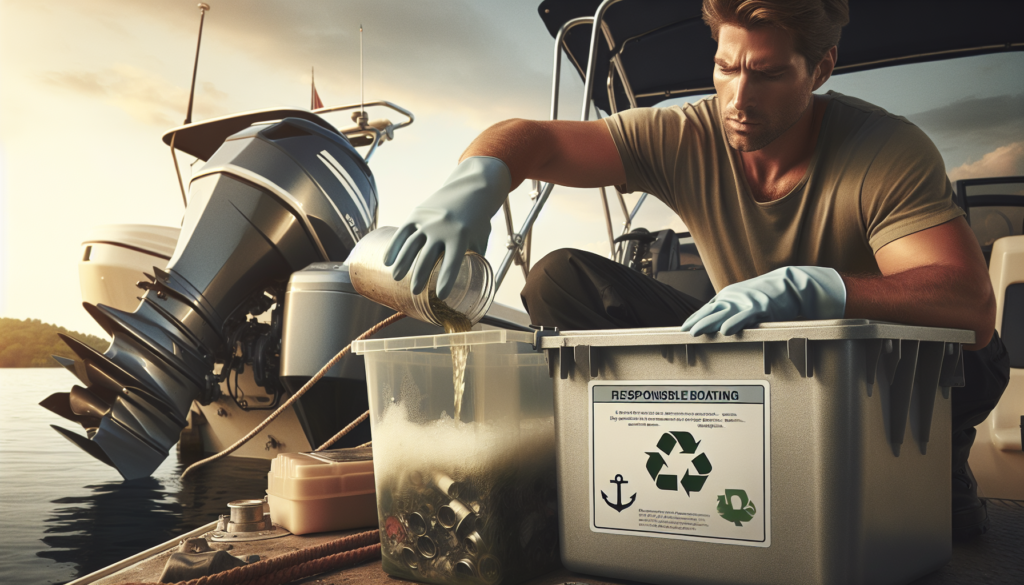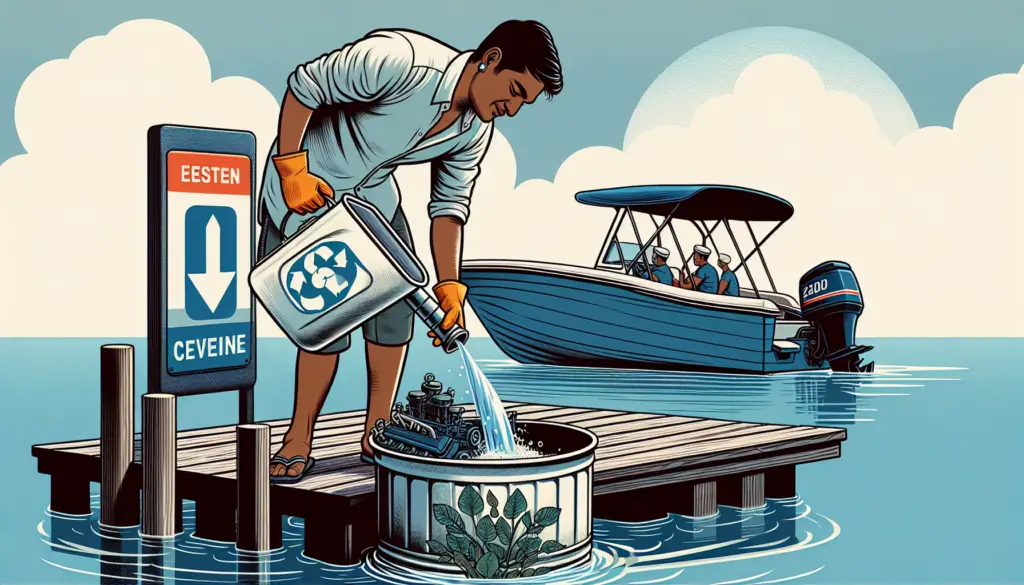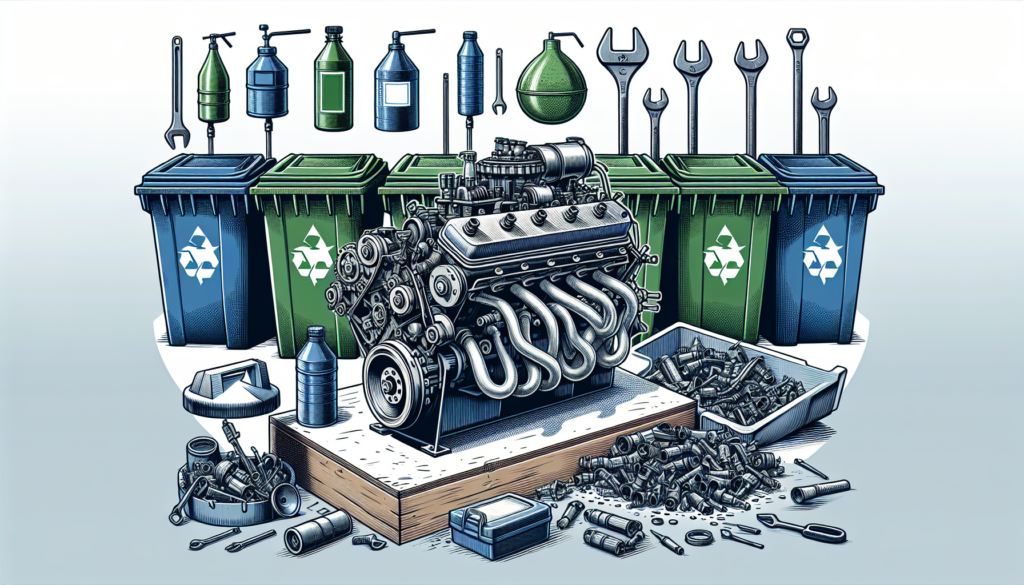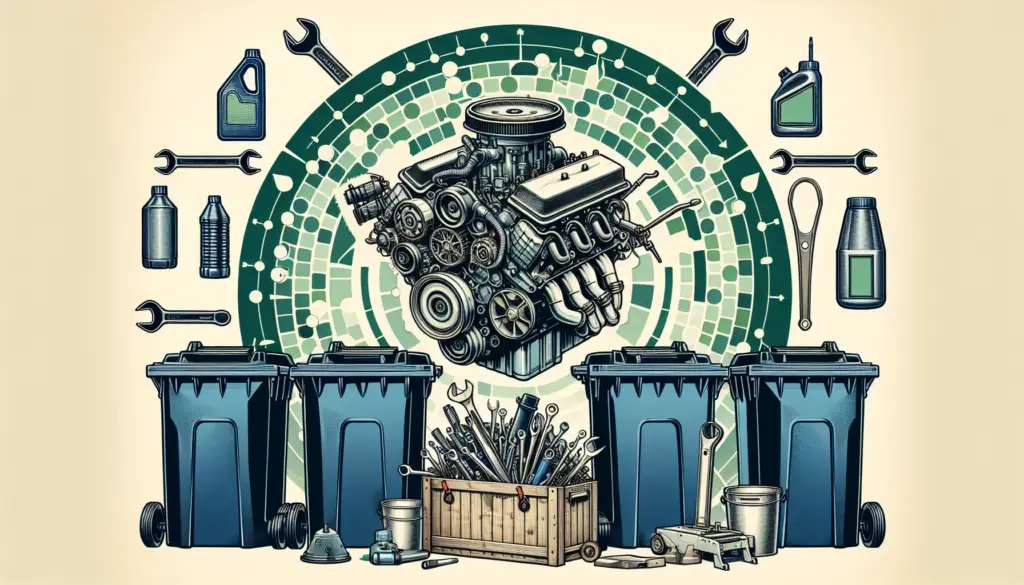You know very well that cruising the open seas or navigating serene rivers on your boat is a thrilling experience. But have you ever thought about what happens to the waste from your boat’s engine? In the pursuit of keeping our waters clean, the article “How To Properly Dispose Of Boat Engine Waste” provides reliable tips and procedures to rid of such waste correctly and responsibly. This crucial guide will not only enlighten you on maintaining a healthy marine environment but also keep you on the right side of the law.

Understanding Boat Engine Waste
Boating is a thrilling and relaxing pastime, yet it can also present several challenges, especially when it comes to maintenance and dealing with boat engine waste. Yeah, that part is not so fun. But it’s pivotal to understand what we’re dealing with here to make sure we’re doing it right.
Definition of Boat Engine Waste
Boat engine waste, often overlooked, is the byproduct originating from the regular use and operation of your boat’s engine. It includes everything from used engine oil and coolant to drained fuel or worn-out oil filters. Keep in mind, we’re not just talking about garbage here, but often hazardous waste that can have adverse effects on our environment if not handled properly.
Types of Boat Engine Waste
The main types of boat engine waste usually come from the oil and fuel, the filters, and the coolant or antifreeze. Used oil and fuel can accrue from normal engine operations, oil filters are typically replaced periodically, and antifreeze is often drained and replaced at regular intervals. All these aspects constitute substantial components of boat engine waste and demand proper handling and disposal.
The Environmental Impact of Boat Engine Waste
Without a doubt, improper disposal of boat engine waste has dire environmental impacts. Used oil or fuel, if wrongly discarded, can contaminate water and soil, harming aquatic and terrestrial life alike. Filters also carry residual oil, which similarly affects the environment when not disposed of correctly. Antifreeze, on the other hand, contains hazardous chemical substances that can inflict severe damage to the natural water ecosystems if allowed to enter water bodies.
Legal Requirements and Regulations
Alright, now you know what we’re up against. But how about staying on the right side of the law while dealing with boat engine waste?
Federal Laws governing Waste Disposal
On a national level, the Environmental Protection Agency (EPA) regulates all kinds of waste disposal, including boat engine waste. It’s your responsibility to make sure you’re complying with all provisions for legal disposal. Violations, as you’ll find out next, can be quite costly.
State Laws on Boat Engine Waste Disposal
In addition to federal laws, you’ve also got to be mindful of varying state regulations on disposing boat engine waste. Some states may have particularly strict requirements, while others may offer more leeway. When in doubt, it’s always a good idea to check with your local environmental or marine agencies for exact guidelines.
Penalties for Non-Compliance with Waste Disposal Laws
So what happens if you decide to play fast and loose with the rules? Not a pretty sight, I assure you. Non-compliance could lead to significant fines or criminal penalties, depending on the severity of the infraction. Remember, ignorance of the law excuses no one, so better to be safe than sorry!

Proactive Prevention of Boat Engine Waste
Now that we’ve discussed the what and the why, let’s focus on how we can proactively prevent or limit the generation of boat engine waste.
Regular Boat Maintenance
Proactively maintain your boat’s engine to reduce waste generation. Regular checkups and timely interventions can drastically limit the amount of waste produced. Replacing aging parts, cleaning the engine, and periodically refreshing the oil and fuels can make a huge difference.
Using Environmentally Friendly Fuels and Oils
Get onboard with ‘green’ boating by switching to environmentally friendly or bio-based lubricants and fuels. These options often biodegrade faster than their traditional counterparts, reducing their potential environmental impact.
Proper Fuel Management to Minimize Waste
Get ahead of the game by practicing smart fuel management. This can include filling up slowly to avoid spills, not topping off the fuel tank, and using gadgets that can help prevent overflow. This will not only save you money but also reduce the waste that you have to eventually dispose of.
Storing Boat Engine Waste
Sometimes, you can’t avoid generating some waste. When you do, make sure to store it properly.
Choosing the Appropriate Storage Containers
Proper storage begins with the right container. Use sealed, sturdy, and labeled containers to store your boat engine waste, ensuring it doesn’t mix with other waste or contaminate the surroundings.
Safe Storage Practices to Minimize Spills
Store your containers in a safe and secure location, away from areas prone to accidents or spills. Don’t forget to keep them at a safe distance from heat sources, as some engine wastes can be flammable.
Properly Sealing Containers to Prevent Leaks
Ensure your containers are sealed correctly. Leaks can lead to contamination and chemical fires, creating a hazardous situation. Be aware of how each type of waste should be stored, as some materials require specific containers or conditions.

Handling Spillages and Accidents
Despite best efforts, spills and accidents can happen. Here’s what you should do when they occur.
Preventive Measures against Spillages
The saying “prevention is better than cure” holds in this case. Equip your boat with absorbent pads or spill kits, and consider getting specialized no-spill equipment to reduce the chance of spills during refueling or maintenance.
Immediate Actions to Take After a Spillage
In case of a spill, act fast! Quickly contain and absorb the spill using pads or rags, and report the incident to local authorities if required. Remember that quick intervention can significantly reduce the damage caused by the spill.
Cleaning Up the Spillage Area
Once the spill has been contained, thoroughly clean the area. Use appropriate cleaners and dispose of used rags and pads properly to prevent secondary contamination.
Disposing of Used Oil and Fuel
Gotten rid of that old oil or fuel? Here’s the next step.
Types of Oil and Fuel
Warmed up engine oil and fuels are not the same as new ones. They may contain additives and impurities, and thus, should be treated as waste and disposed of through designated methods.
Safe Handling of Used Oil and Fuel
Handling used oil and fuel requires care. Make sure to use appropriate protective gear and handle containers carefully to avoid spills or leaks.
Locations for Disposal of Used Oil and Fuel
Check with your local authorities or waste management centers to learn about the designated locations for disposing of used oil and fuel. They may have specific programs or take-back centers to aid in proper disposal.

Disposing of Oil Filters
Spoiled filters also need to be handled properly. Let’s see how.
Significance of Correct Oil Filter Disposal
Used oil filters contain trace amounts of oil that can still contaminate the environment. Therefore, correct disposal is equally as important as dealing with the larger volumes of waste engine oil or fuel.
Options for Oil Filter Disposal
When discarding used filters, don’t just toss them in the trash. Many recycling centers accept used oil filters as these can be drained, crushed, and recycled.
Recycling Oil Filters
For recycling purposes, batteries and filters are treated as scrap metal and can be recycled into new products. By choosing to recycle used oil filters, you’re contributing to a circular economy and reducing your environmental footprint.
Disposing of Antifreeze
Antifreeze comes with its own set of challenges. Here’s how to handle them.
Why Antifreeze Must Be Disposed of Correctly
Antifreeze can be particularly damaging to the environment due to its chemical composition. It’s crucial to dispose of it properly, as it’s toxic to both human health and the environment if not handled correctly.
Safe Handling and Storage of Antifreeze
When handling antifreeze, wear protective gear and store it in a sealed container labeled “Antifreeze.” Antifreeze should be stored separately from other types of waste.
Options for Antifreeze Disposal
Most communities and local waste management centers offer facilities for safe antifreeze disposal or recycling. In some areas, automotive shops also accept used antifreeze. It’s worth to find out what’s available near you.
Professional Waste Disposal Services
When in doubt, turn to the experts. Here’s when and how to do that.
When to Consider a Professional Service
If you’re dealing with larger volumes of waste or if you’re unsure about proper disposal methods, it might be best to hire a professional waste disposal service. This ensures that the waste is handled safely and in compliance with all legal requirements.
Choosing the Right Waste Disposal Service
The key here is to research different companies and check their credentials. Opt for a licensed and insured service provider with a good reputation for environmental responsibility.
Cost and Terms of Professional Disposal Services
While professional services come at a cost, the peace of mind knowing that your waste has been properly disposed of is priceless. Most companies will provide a quote for services, so be sure to review the terms before making a decision.
Promoting Environmentally-friendly Boating Habits
As boaters, we share a responsibility towards our water bodies and the environment at large. Adopting and Promoting green habits is a way to acknowledge this duty.
Educating Other Boaters
Spend time educating your fellow boaters about the importance of proper waste disposal and share techniques or resources to encourage more responsible habits.
Participating in Clean-up Drives
Joining local clean-up drives or organizing such events can also help to raise awareness and keep our waters clean. Every bit of effort counts!
Investing in Greener Boating Equipment
Finally, investing in greener boating equipment, like environmentally friendly antifreeze or bio-based lubricants, can help reduce the environmental impact of your boating activities. In the long run, every change adds up!
In conclusion, proper disposal of boat engine waste is crucial to sustain our love for boating while preserving the environment we enjoy so much. It requires a solid understanding of boat engine waste, maintaining legal compliance, adopting preventive practices, and proper storage. Moreover, appropriate actions during spills, handling and disposing of oil, fuel, filters, and antifreeze are essential. Utilizing professional services when needed, and overall promotion of green boating habits can create a significant impact in minimizing pollution and nurturing cleaner, healthier water bodies for the generations to come.

